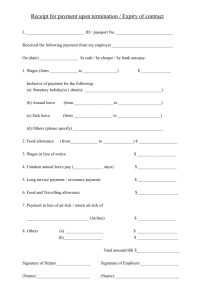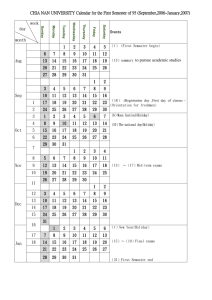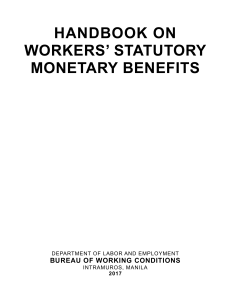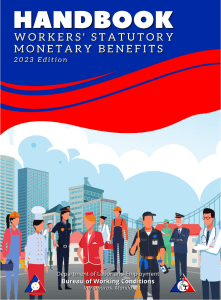Save
advertisement
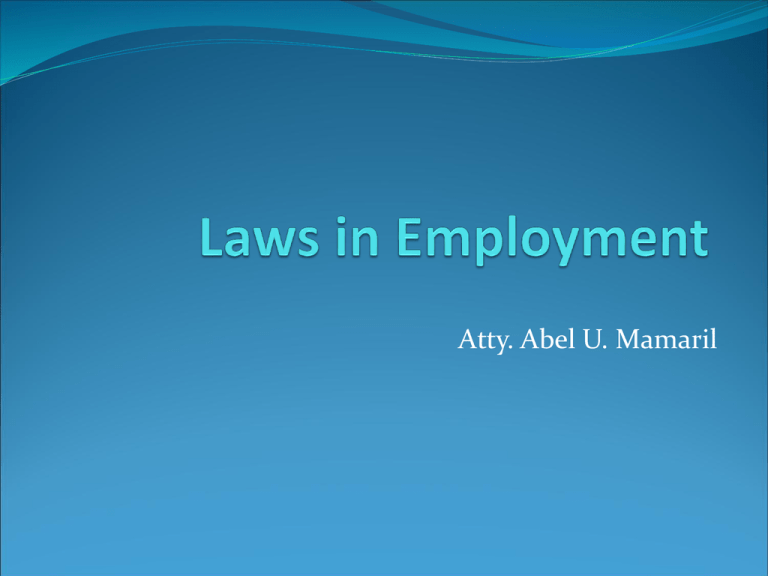
Atty. Abel U. Mamaril Outline of Presentation: 1. CONTRACT 2. BASIC RIGHTS OF WORKERS 3. TERMINATION Contract A contract is a meeting of minds between two persons whereby one binds himself, with respect to the other, to give something or to render some service. ( Art 1305 NCC) BASIC RIGHTS OF WORKERS: 1.SECURITY OF TENURE - Workers cannot be dismissed without just and authorized causes and due process. - Workers shall be regular after 6 months probation Termination by employer Just causes: (a) Serious misconduct or willful disobedience by the employee of the lawful orders in connection with his work; (b) Gross and habitual neglect by the employee of his duties; (c) Fraud or willful breach of trust reposed to the employee by the employer (d) Commission of a crime the employer or any immediate member of his family or his duly authorized representative; Termination by employer Authorize causes: 1.Installation of labor-saving devices, 2.redundancy, 3.retrenchment to prevent losses or 4. the closing or cessation of operation of the establishment Termination by employee A. Without just cause written notice on the employer at least 1 month in advance. B. With Just Cause no need of any notice (1)Serious insult by the employer on the honor and person of the employee; (2)Inhuman and unbearable treatment (3)Commission of a crime by the employer or his representative against the person of the employee or any of the immediate members of his family. Due Process Two notices rule: 1.State the charges and give specific time to reply. 2.Notice of termination Classification of Employees I. Regular Employees Either from A. the nature of the work or B. the duration of the employment. II. Casual employees A. Is one who is not performing activities which are usually necessary or desirable in the usual business or trade of the employer, and B. He is a casual employee only for one year. III. Probationary Employees - shall not exceed six months from the date the employee started working 2.HOURS OF WORK - Normal working hours shall not exceed eight (8) hours per day. (Art 83) - Meal break of less than one hour and short rest period shall be considered compensable working hours 3. WEEKLY REST DAY ( Art 91) - A rest period of not less than 24 consecutive hours after every 6 consecutive normal work days. Who determines the employees rest day? 4. WAGE AND WAGE RELATED BENEFITS A. Mininum wage should not be lower than what was determined by RTWPB SUMMARY OF CURRENT REGIONAL DAILY MINIMUM WAGE RATES Non-Agriculture, Agriculture As of March 2009(In pesos) Agricultural Region Date of Effectivity Non-agricultural Plantation NonPlantation NCR June 14, 2008 P 345.00 - 382.00 P 345.00 P 345.00 CAR June 16, 2008 243.00 - 260.00 226.00 242.00 226.00 242.00 I June 22, 2008 220.00 - 240.00 220.00 195.00 II June 15, 2008 227.00 - 235.00 III June 16, 2008 251.00 - 302.00 Source:http://www.nwpc.dole.gov.ph 215.00 - 223.00 215.00 - 223.00 236.00 272.00 216.00 - 256.00 Regular AND Special Holidays 1. January 1 New Year’s Day 2. March 20 Maundy Thursday 3. March 21 Good Friday 4. April 7 Araw ng Kagitingan (in lieu of April 9) 5. May 5 Labor Day (in lieu of May 1) May 1 6. June 16 Independence Day (in lieu of June 12) August 25 Ninoy Aquino Day (in lieu of August 21) 7. August 25 National Heroes Day October 1 Eid’l Fitr (to be confirmed by the OMA) November 1 All Saints Day 8. December 1 Bonifacio Day (in lieu of Nov. 30) 9. December 25 Christmas Day December 26 - Special Holiday December 29 -Specia Holiday 10. December 30 - Rizal Day Monday December 31 Last Day of the Year B.Holiday Pay (Art 94) It is a day’s pay given to an employee even if he does not work on a regular holiday provided the following conditions are meet: a. When there are two (2) consecutive regular holidays, the employee will only be entitled for the holiday pays if he is present o the day immediately preceding the first holiday. b. Employees will be entitled to a holiday pay provided he worked on the day immediately preceding the rest day. C. PREMIUM PAY for work within 8 hours on a: 1. Special or Rest day – 30%ofhis regular wage. 2. Rest day falling on a Special 3. Rest day falling on a regular holiday – 30%of 200%of his regular wage D.OVERTIME PAY for work in excess of 8 hours on: 1. Ordinary days – plus 25% of the basic hourly rate 2. Special days, rest Days and holidays – plus 30% of the regular hourly rate( Art 87) QUESTION: Can undertime be offset by overtime? day– 50%( Art 93) E. Night Shift Differential Not less than 10% of his regular wage for every hour of work performed between 10P.M. - 6 A.M. (Art 89) F. Service incentive Leave 5 days with pay per year of service whether continuous or broken (Art 95) G. Service Charges 85%for distribution to rank and file employees; 15% for losses, breakages or distribution to managerial employees. H. 13th month pay - 1/12 of the total basic salary earned within the calendar year. I. Paternity Leave(R.A. 8187)June 11, 1996 1.granted to married men working in public or private sectors. 2.This benefit allows married male not to report to work for seven (7) days with pay provided: 3.That the spouse has delivered or suffered a miscarriage 4.PL is granted for the first four (4) deliveries of the legitimate spouse with whom he is cohabiting with. J. Maternity Leave ( R.A. 8282) May 1, 1997 a. Has paid at least three(3) monthly contribution in a 12 month period immediately preceding the semester of her child birth or miscarriage b. shall be paid only for four (4) deliveries or miscarriages; shall be paid a daily maternity benefit equivalent to 100% of her average daily salary credit for: 60 days regular delivery 78 days in case of caesarian delivery 5. SAFE AND HEALTHFUL CONDITIONS OF WORK AND WELFARE SERVICES Ex. a. Proper illumination and ventilation, b. Fire exits and extinguishers, c. occupation health services, d. Family welfare/family planning services at the workplace, etc. 6. SELF ORGANIZATION AND COLLECTIVE BARGAINING - Collective Bargaining Agreement RETIREMENT When can an employee retire? Any employee may retire upon: a. Reaching the retirement age established in the collective bargaining agreement, OR b. other applicable employment contract. When no retirement benefits plan or agreement in the establishment: a. upon reaching the age of 60 or more, but not beyond 65 years which is hereby declared the compulsory retirement age, has served at least five (5) years in the said establishment, - shall be entitled to retirement pay equivalent to at least one-half (1/2) month salary for every year of service, a fraction of at least six (6) months being considered as one whole year. - the term "one half (1/2) month" salary shall mean fifteen (15) days + one-twelfth (1/12) of the 13th month pay and the cash equivalent of not more than five (5) days of service incentive leaves. Any Question?

